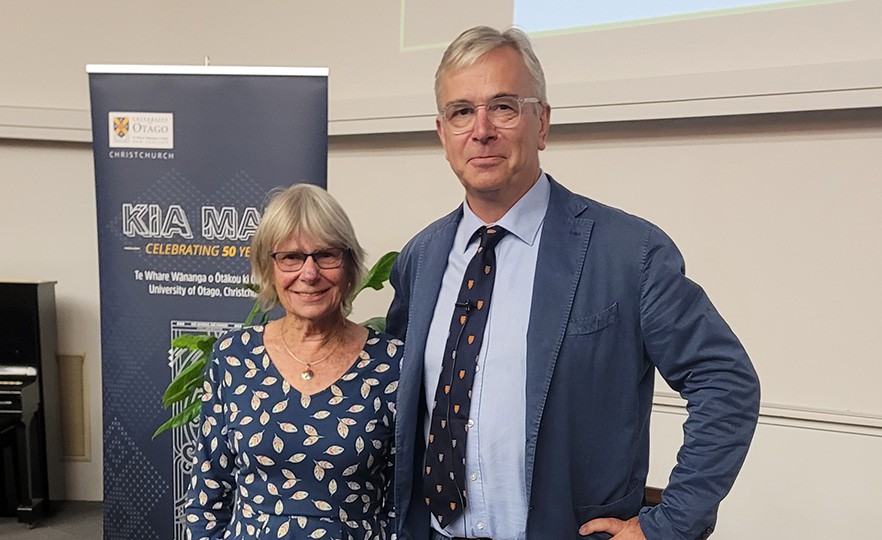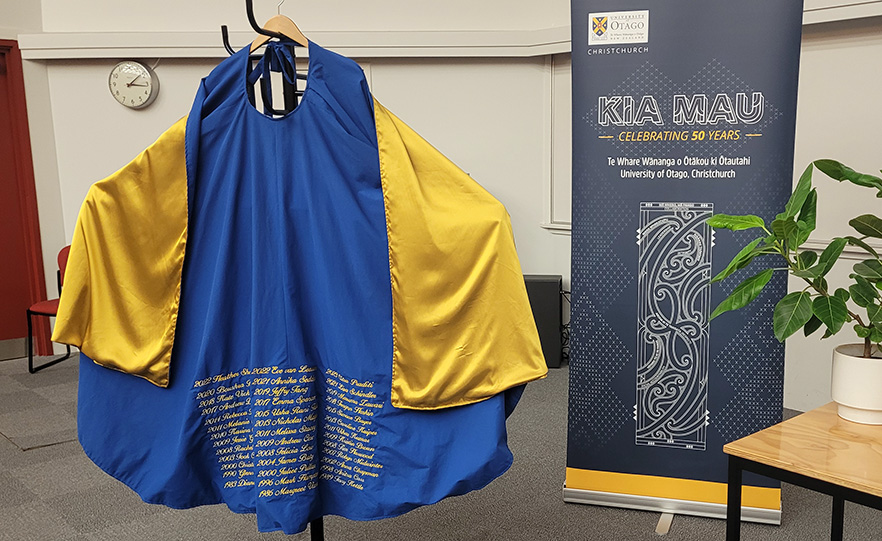
Professor Christine Winterbourn and Professor Mike Murphy at the Mātai Hāora Centre for Redox Biology and Medicine symposium held in February 2023.
Leading lights in the field of oxidative stress and health research took centre stage at a day-long symposium at the University of Otago, Christchurch recently.
The Department of Pathology and Biomedical Science's newly-named Mātai Hāora – the Centre for Redox Biology and Medicine (formerly known as the Centre for Free Radical Research) held the symposium to celebrate winning the University of Otago's Group Research Award for 2022. The event also marked the 50th anniversary of the Centre's founding publication.
The symposium, held on 24 February 2023 in the campus' Rolleston Lecture Theatre, kicked off with a mihi whakatau by kaumātua Rangihau Te Moana, followed by an overview of the Centre's scientific whakapapa and revealing of its new name by Director Professor Mark Hampton.
Dean and Head of Campus Professor Suzanne Pitama presented Mātai Hāora research staff with the University Group Award, in recognition of the Centre's outstanding research performance at international level.
Speakers then presented current mahi in the Centre's three main areas of research; infection and inflammation (Professor Tony Kettle, Dr Nina Dickerhof, Grace Borichevsky, Heather Shearer); cancer (Professor Margreet Vissers, Dr Christoph Goebl, Tess Featherston, Carlos Smith-Diaz, Dr Martina Paumann-Page); and ageing (Associate Professor Liz Ledgerwood (Biochemistry Dunedin) and Te-Rina King-Hudson).
A session titled “Then and Now” was an opportunity for four former students, Dr Kristin Brown (University of Melbourne), Dr Andrew Cox (University of Melbourne), Dr Tim Harwood (Cawthron Institute) and Dr Melanie Coker (Christchurch City Council) to discuss their own career journeys.
Professor Christine Winterbourn completed this session, reflecting on the huge changes in science she's witnessed during her 50-year involvement with the University of Otago, and her role in establishing the Centre five decades ago. She was the first woman to win Aotearoa New Zealand's top science accolade, the Rutherford Medal.
One legacy of Professor Winterbourn's remarkable scientific achievements is the annual campus Winterbourn Lecture – held this year at Mātai Hāora's one-day symposium.
Professor Mike Murphy, one of the world's leading scientists in mitochondrial research, presented the Winterbourn lecture with his talk “Mitochondrial superoxide in cardiac ischemia-reperfusion injury”.
Programme Leader at the University of Cambridge's Mitochondrial Biology Unit, Professor Murphy worked at Otago University through the 1990s, where he developed MitoQ – a mitochondria-targeting antioxidant which holds promise for the prevention of heart disease and other diseases of ageing.
His lecture focused on his Cambridge group's investigation into the damage to our body following a heart attack or stroke, when oxygen returns to the cells deprived due to the blockage of blood vessels. He discussed new treatments his team are developing to reduce this damage. He also paid homage to the research work of Professor Winterbourn and other Mātai Hāora colleagues and the influence their research continues to hold for him.
Mātai Hāora consists of six principal investigators and several experienced research fellows who have combined their expertise in chemistry, biochemistry, molecular biology and cell biology to investigate how free radicals and antioxidants work inside the body and how this knowledge can be used to diagnose and treat human disease and maintain optimal health.
During the symposium, Professor Hampton presented gifts to Otago University student Charles Cave for his fundraising efforts for the group last year, and to Lincoln High School students Elsie Duncan and Jorja Quinn, who donated the prize money they earned from winning a high school science fair to the research team.
The celebration also included a display of the “Free Radical” gown, embroidered with the name of every student who has completed their PhD within the Centre.

The “Free Radical” gown, embroidered with the name of every student who has completed their PhD within Mātai Hāora Centre for Redox Biology and Medicine.
The University Group Award was judged on performance in the last five years. During this time the Centre's researchers published more than 100 papers in internationally peer-reviewed journals, and earned more than $15 million in competitive external funding, predominantly from the Royal Society Marsden Fund and the Health Research Council. Professor Hampton's talk also highlighted the importance of small funding agencies, including the Canterbury Medical Research Foundation and public donations that were used to support emerging researchers and test new ideas that led to larger project applications.
Mātai Hāora's win was the second consecutive University of Otago Group Award for the Christchurch campus. Although not awarded in 2021, the Department of Medicine's Christchurch Heart Institute picked up the award in 2020.